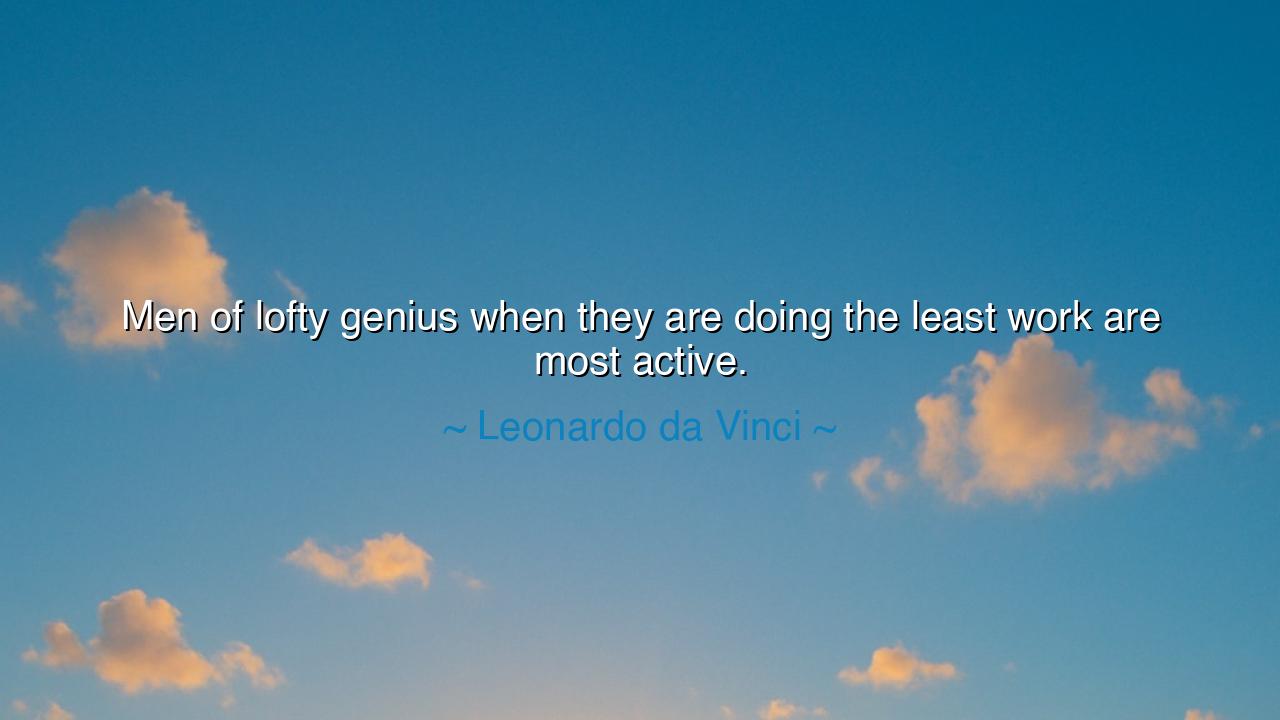
Men of lofty genius when they are doing the least work are most






The words of Leonardo da Vinci shine with timeless brilliance: “Men of lofty genius when they are doing the least work are most active.” At first hearing, the saying seems paradoxical. How can one be most active in moments of idleness? Yet Leonardo, master of invention and observer of nature, speaks here of the hidden labor of the mind. For the genius does not cease to create when the hands rest; even in stillness, his thoughts move like rivers beneath the earth, carving new paths unseen until they break forth in sudden streams of inspiration.
The origin of this quote lies in Leonardo’s own life. He was a man often criticized for beginning works and leaving them unfinished, for wandering in thought rather than producing visible results. But what seemed to others like idleness was, in truth, his greatest activity. In the silence of contemplation, he observed the flight of birds, the flow of water, the anatomy of the human frame. His genius stirred most fiercely when he appeared to be doing nothing, for his mind was weaving connections that the world had never yet seen.
The ancients knew this mystery as well. Archimedes discovered the principle of displacement not in the laboratory but while bathing, when his body sank into water and his mind, freed from immediate toil, caught sight of a truth eternal. So too, Newton, centuries later, beheld the falling apple and in that simple moment of rest unlocked the laws of gravitation. Such examples show that idleness in the body may be the highest activity of the spirit, when the imagination roams unchained.
Consider also the story of Albert Einstein, who often spoke of the value of daydreaming. When criticized for his apparent lack of practical labor, he explained that his breakthroughs came not from constant effort, but from long hours of quiet reflection, imagining himself riding upon a beam of light. Out of these “idle” thoughts came the theory of relativity, changing forever mankind’s understanding of the universe. Like Leonardo, he proved that true activity lies not always in the movement of the hands, but in the awakening of the mind.
The meaning of Leonardo’s words, then, is clear: do not mistake outward stillness for emptiness. The man of lofty genius may appear to sit quietly, yet within him burns a tempest of thought. He is not bound by constant toil, but by the power of contemplation, for it is in silence that new worlds are born. The common man may measure activity by sweat and labor, but the wise know that the greatest achievements often spring from moments of apparent idleness.
The lesson for us is profound: give space for thought, give value to rest. In a world that glorifies constant busyness, we must remember that creation requires silence as much as noise, and stillness as much as striving. Let your mind wander, let it pause, let it breathe—only then can insight take root. To be forever working without reflection is to plow the field without ever planting the seed.
Practical action is simple: allow yourself time each day to be still. Walk without distraction, sit in silence, gaze upon nature. In these moments, trust that your mind is at work in ways unseen. And when you find yourself accused of idleness, remember Leonardo’s words: when you seem to be doing the least, you may in truth be most active. For it is in these hidden hours that genius stirs, that wisdom awakens, and that the soul grows fertile for discovery.
So let us carry Leonardo’s wisdom into our own lives. Let us not measure worth only by labor, nor genius only by output. Let us honor the unseen fire of thought, the quiet storm of the spirit. For in those moments of stillness, when the world believes us idle, we may be at our most alive, and the seeds of greatness may be silently taking root.






AAdministratorAdministrator
Welcome, honored guests. Please leave a comment, we will respond soon